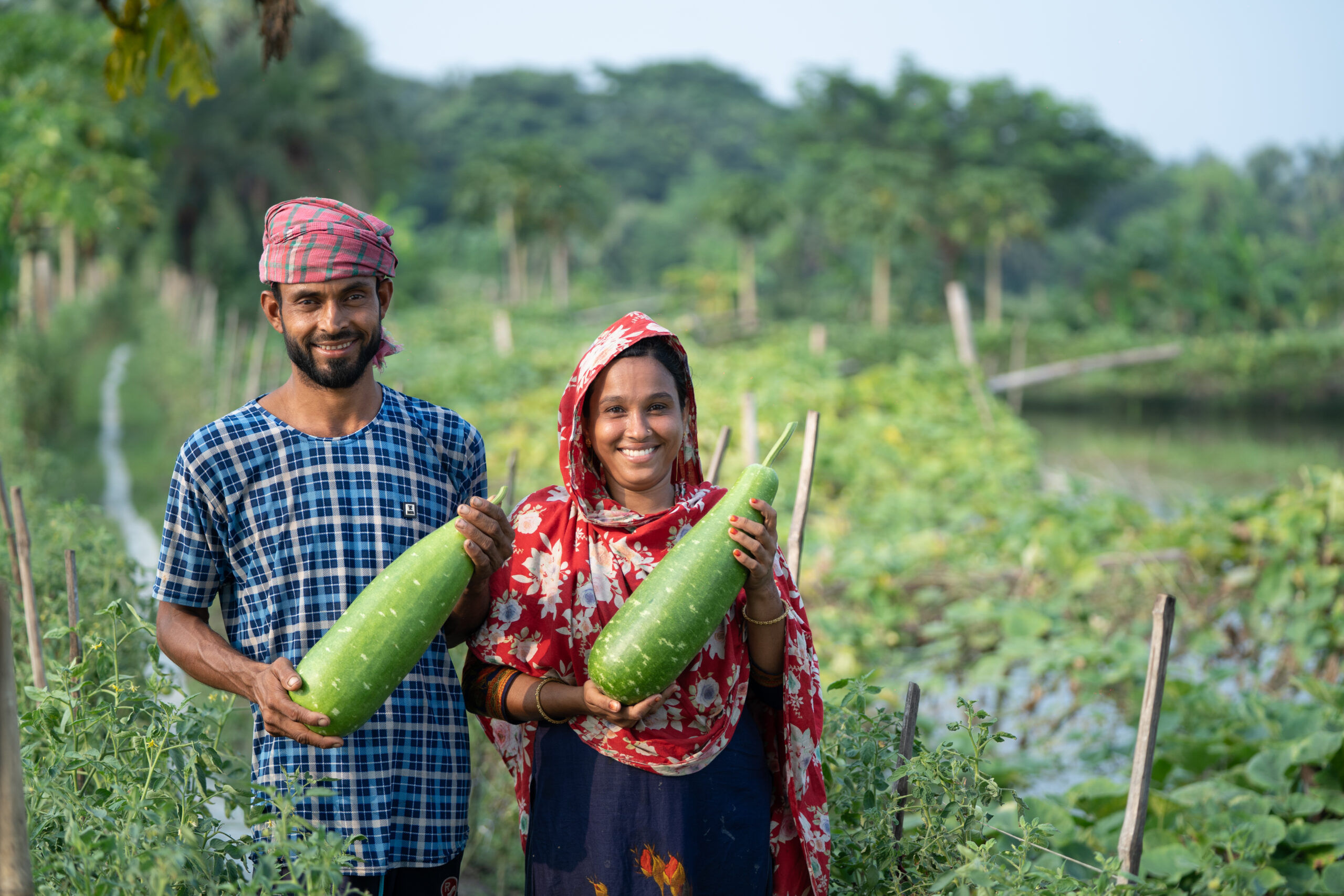Highlights
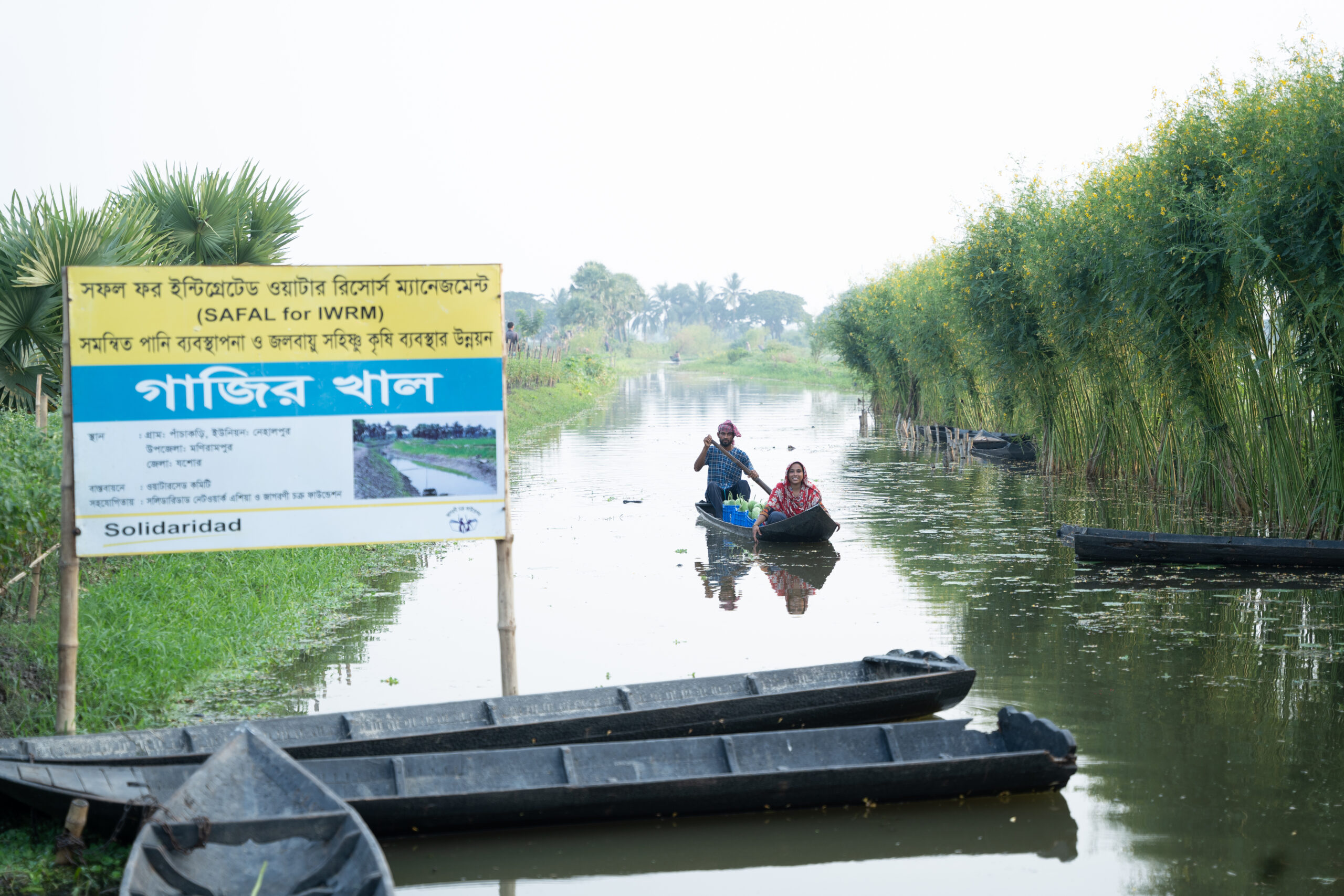
Water access transforms agriculture
The SAFAL for IWRM programme is working towards ensuring sustainable use, protection, and the restoration of watersheds for resilient agriculture in southwest Bangladesh. Through a community engagement process, the Gazir Canal in Nehalpur, Jashore district, was dredged in March 2023. This has improved productivity and cropping intensity in over 575 hectares of land, benefitting 982 smallholders by reducing their dependence on erratic rainfall and lowering production costs.
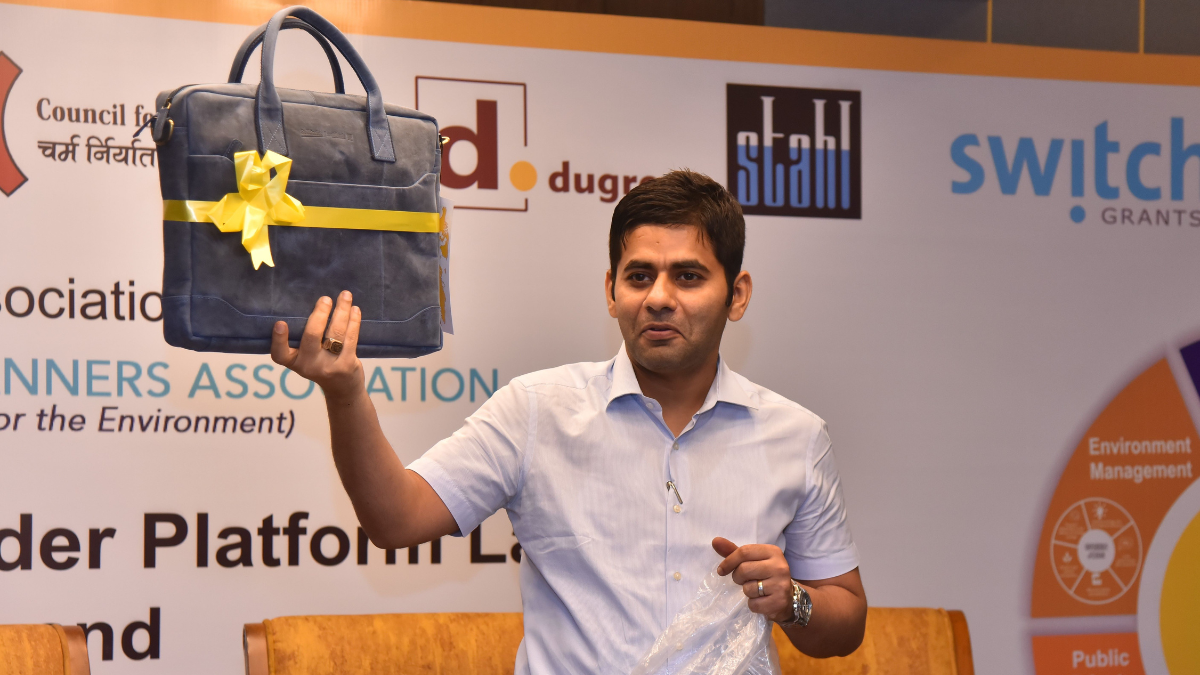
Creating Green Jobs
To take the leather sector to the next level, Solidaridad Asia believes it is imperative to empower and upskill the tannery workforce. Solidaridad has forged a strategic partnership with the Council for Leather Exports to train 150,000 workers over 5 years on innovative and circular practices and create a green and skilled workforce in India and shape a sustainable future for the industry.
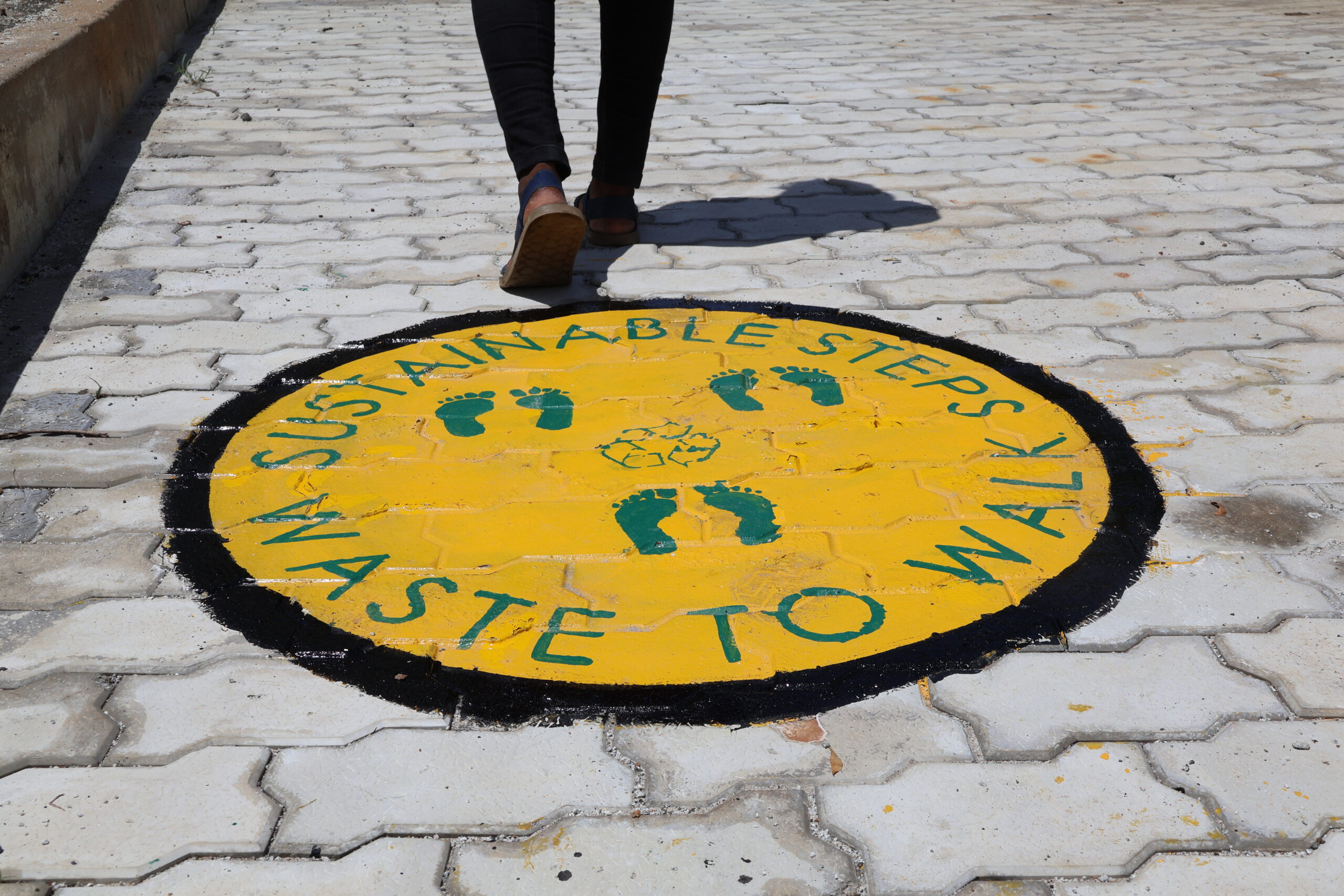
Pollution Prevention
Our interventions have focused on water optimization, effluent reduction, circular practices (waste to value) and greenhouse gas reduction in the leather sector. The Centre of Sustainability in Kolkata showcases techno-commercially viable solutions aimed at reducing the environmental footprint of the tanneries. Our innovations are now part of the pollution charter by the Central Pollution Control Board in India. Our proven model has paved the way for a 3-year programme in textiles, supported by the Government of India. The learnings are being scaled up in Bangladesh and Sri Lanka
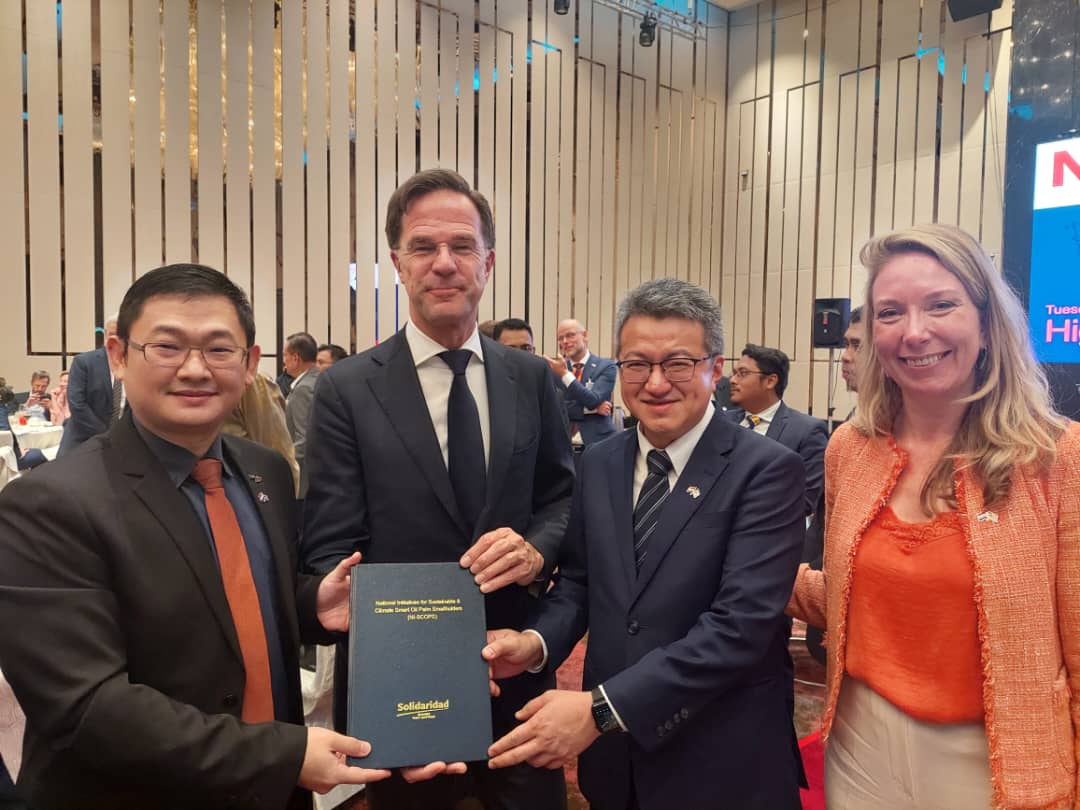
Petitioning for inclusive EU policy
Solidaridad in Malaysia submitted a memorandum to the Dutch Prime Minister on behalf of smallholder farmers, highlighting concerns over the EU Deforestation Regulation (EUDR). Action was sought on three critical goals: 1) Establish inclusivity quota for palm oil produced by smallholders to gain preferential access to the EU market; 2) Align the Malaysia Sustainable Palm Oil (MSPO) guidelines with EUDR to facilitate compliance and market access; 3) Develop a mechanism for carbon farming that incentivizes sustainable practices by smallholders
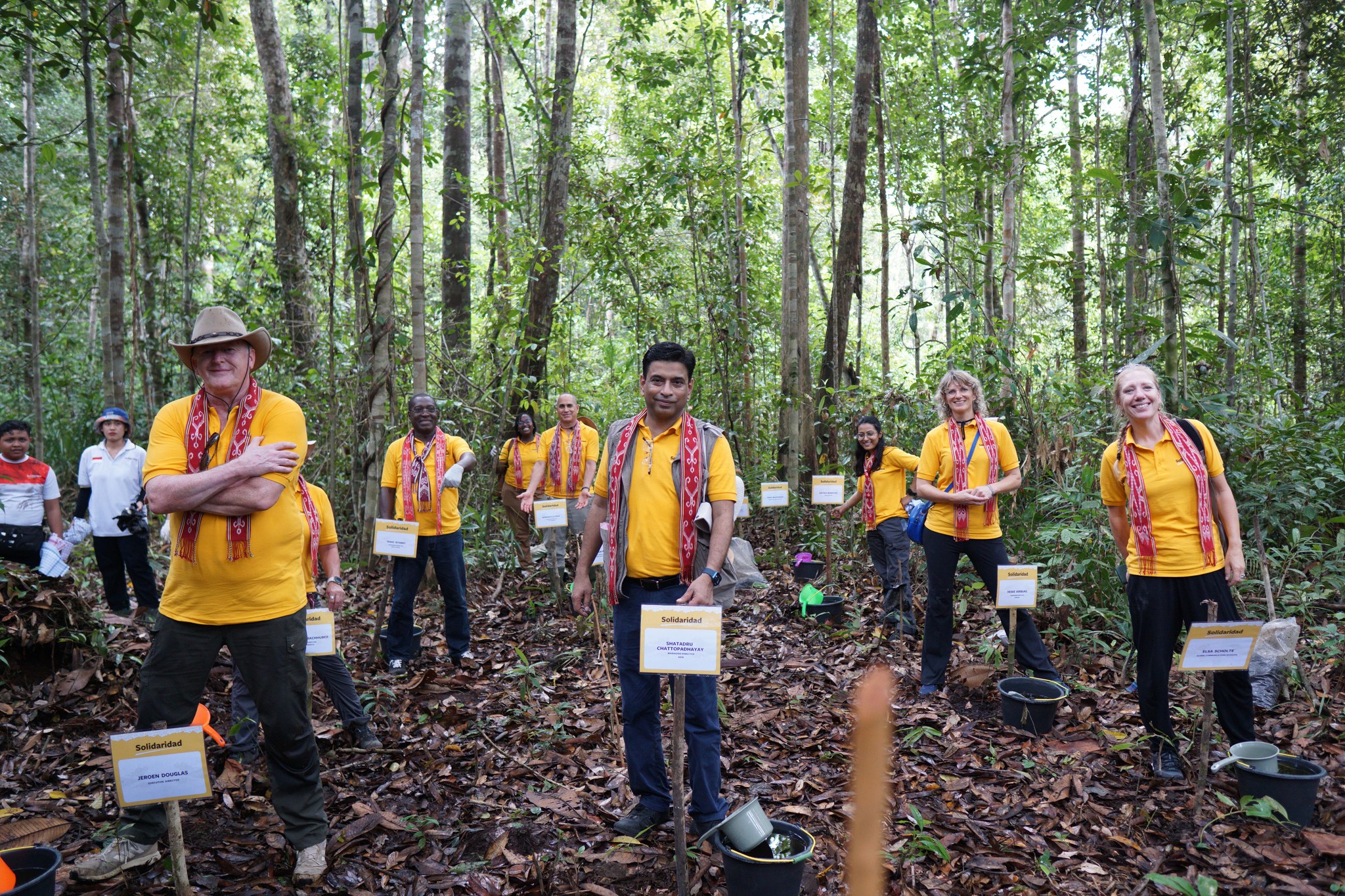
Preserving forests and livelihoods
In Indonesia, deforestation leading to severe land degradation is a major concern, affecting indigenous communities like Dayaks. In the 34-hectare Tawang Serimbak forest in Ensaid Panjang village, West Kalimantan, the agroforestry programme, with partners like CU Keling Kumang, is supporting 192 Dayak families as they reclaim their rights to livelihood and culture. We work on sustainable management of forest resources, improved agricultural productivity, and supplementary income by promotion of ecotourism and women-run weaving businesses.
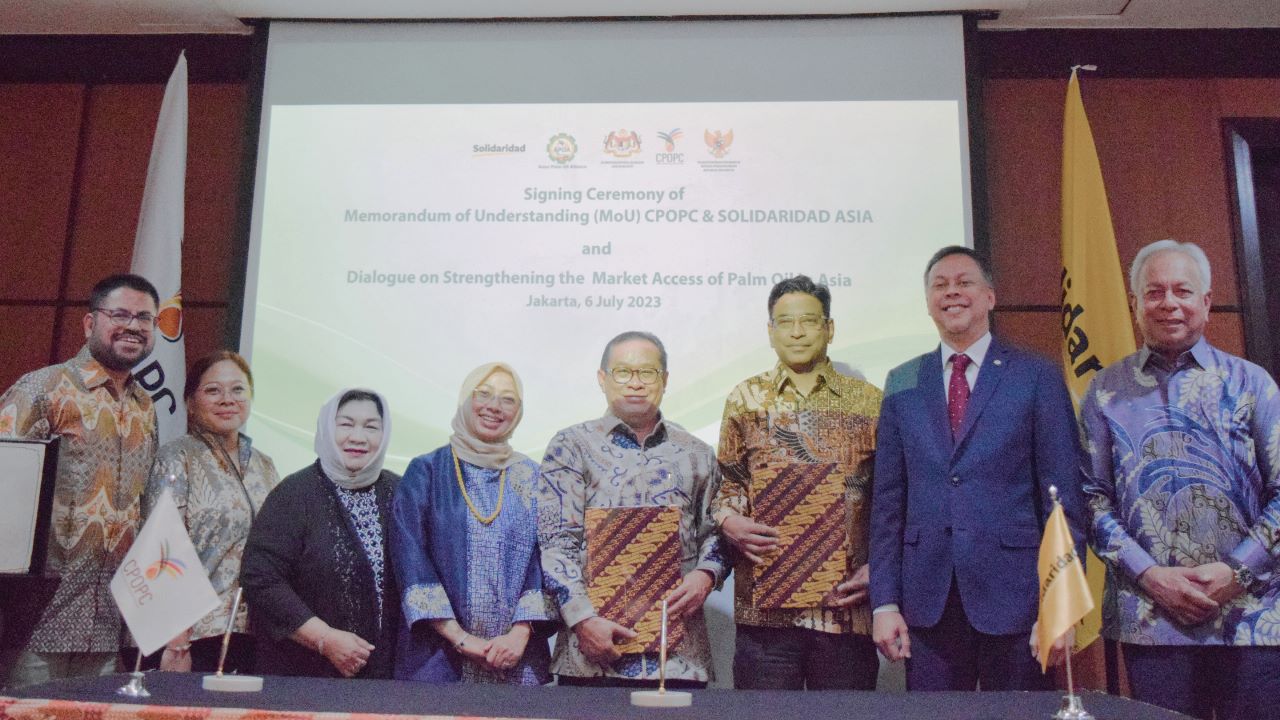
A Partnership for Sustainable Palm Oil
Solidaridad Asia and the Council of Palm Oil Producing Countries have started a collaboration that aims to address key challenges in the palm oil industry by promoting responsible practices. Key objectives include advancing sustainable practices among smallholders, developing a robust sustainability standard structure, creating an enabling policy environment, and improving joint communication to raise awareness about sustainable palm oil.
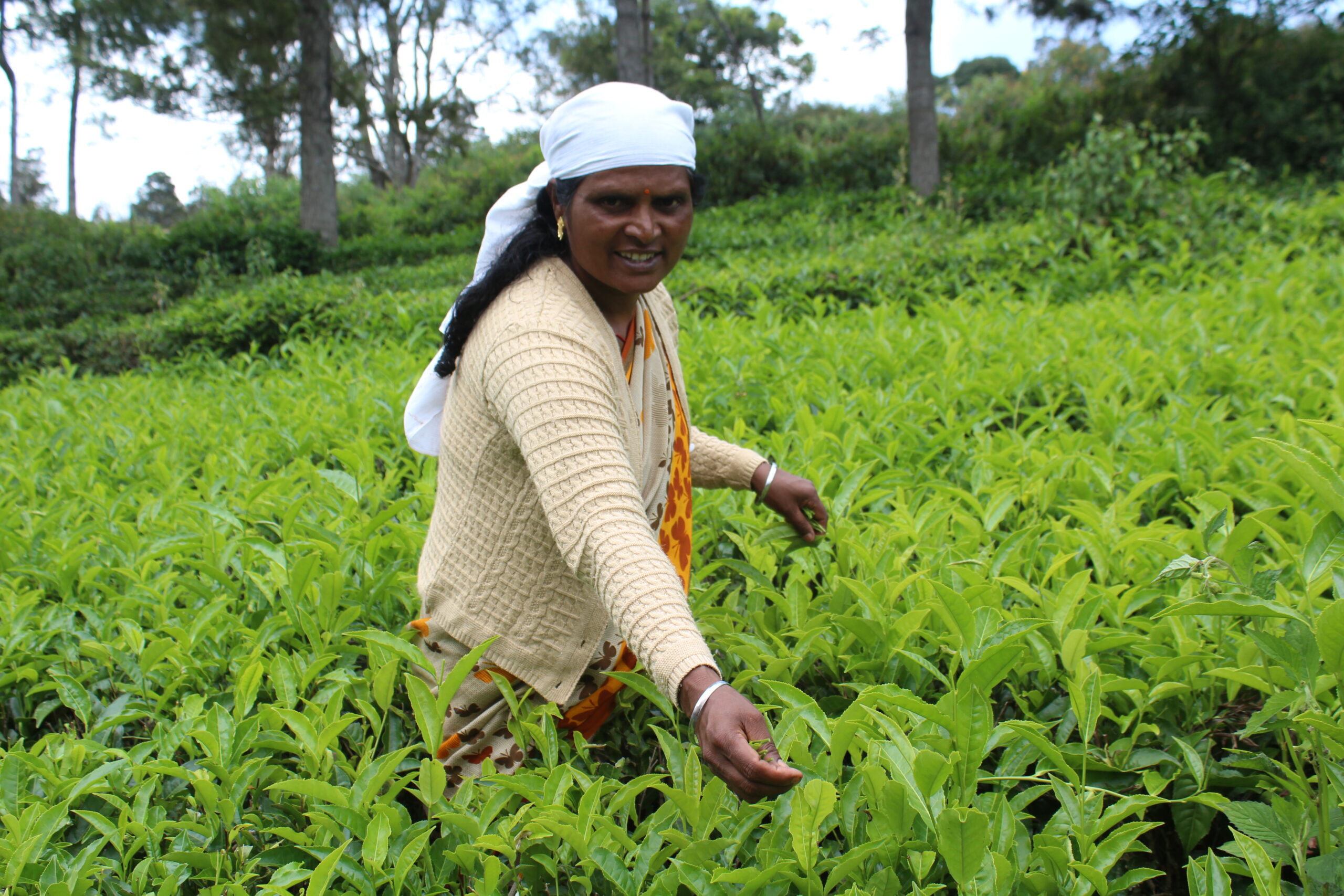
Ascending the Tea Value Chain
We support small tea growers in their efforts to organize themselves. This enables them to ascend the value chain by establishing their own processing facilities for direct trading of produce. In 2023, the tea programme supported the establishment of 24 farmer-producer organizations (FPOs) (with 1,489 growers), and 124 self-help groups (with 2,995 growers) in India. In partnership with the Confederation of Small Tea Growers Association, a white paper on sectoral challenges and policy recommendations was submitted to the Government of India. Traceability from farm-to-cup through a QR code was introduced in South India.
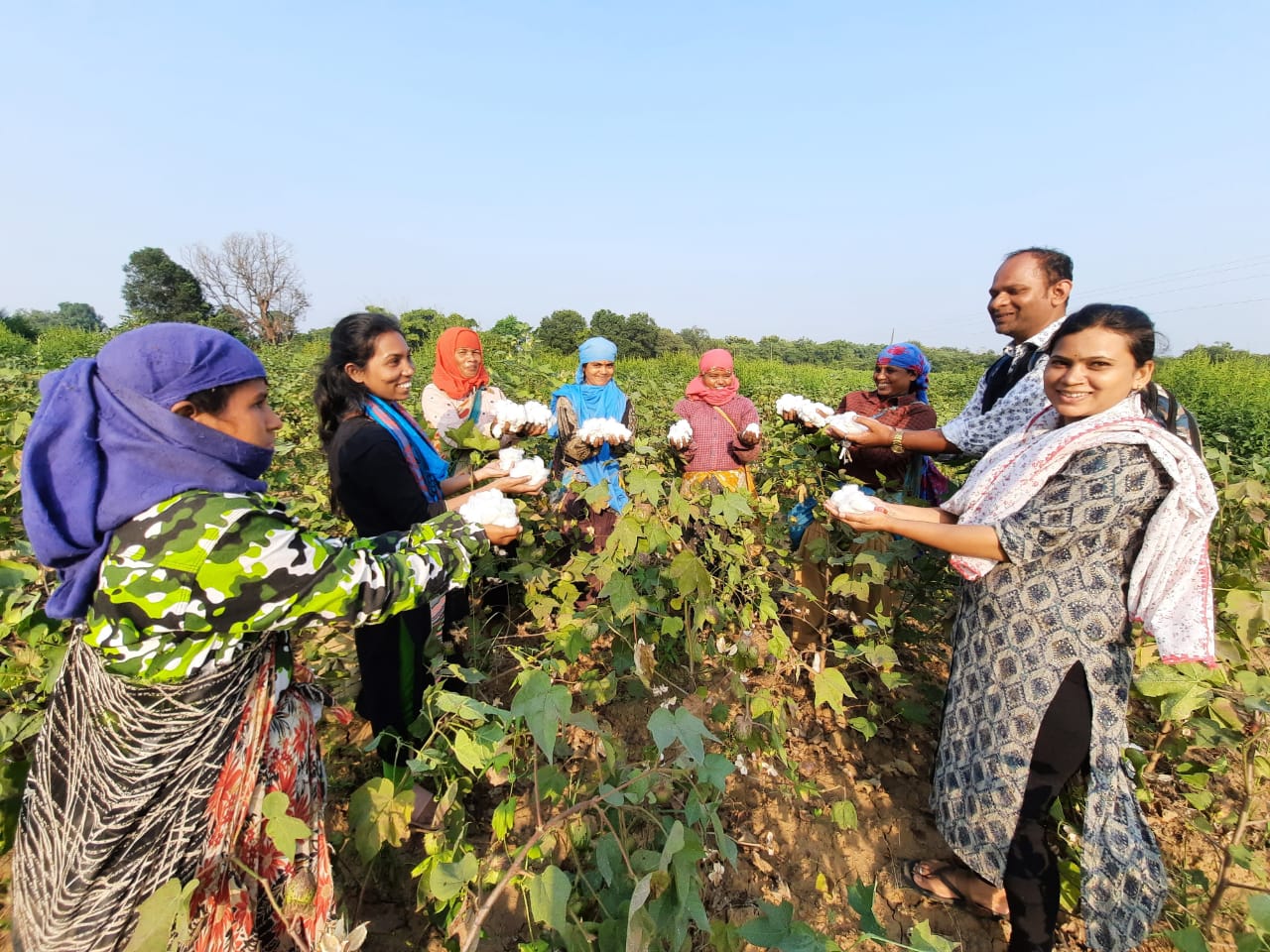
Cotton Farmers Accrue Regenerative Benefits
Cotton growers in India are turning over a new leaf with regenerative agriculture. In Maharashtra, 17,000 farmers are regenagri certified with 25,893.37 hectares of land under regenerative farming. Efficient farm and water management practices and greater use of on-farm bio-inputs instead of chemicals, have already led to around 12 percent reduction in production cost and are positively impacting the yield. In Madhya Pradesh, 10,000 cotton farmers are on the way to become regenagri certified in 2024.
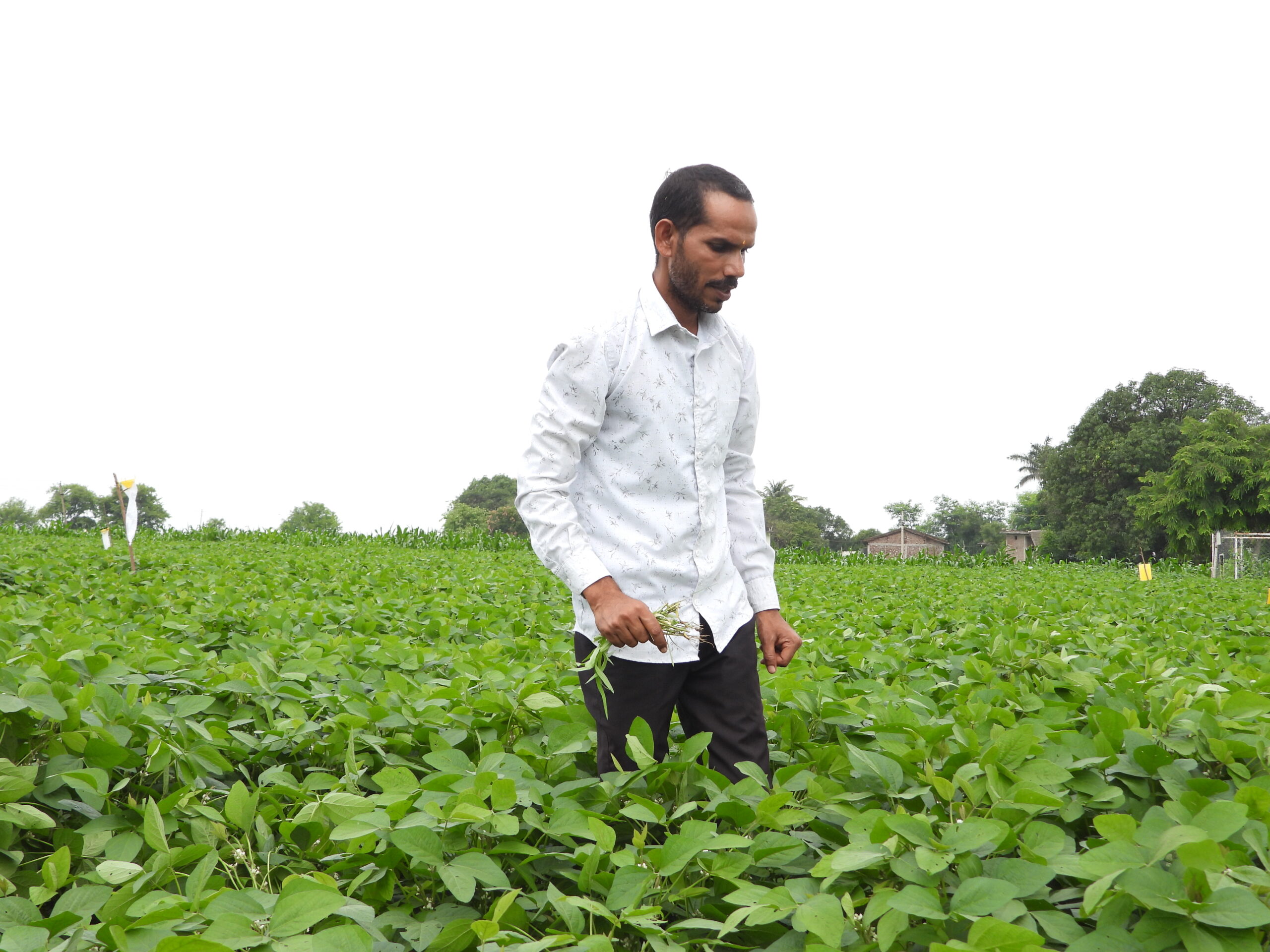
Securing it with Soy
Conceptualized to deal with the food security requirements of a rapidly-growing population, the India Sustainable Soy Programme is promoting regenerative and climate-smart soy cropping systems among 160,000 small-scale farmers, in 16 districts of central India. Around 65,000 farmers have improved income, 28 farmer-producer organizations (FPOs) and 200 rural entrepreneurs have been supported, and 10,151 farmers are certified under the Indian Standards for Sustainable Soy, a benchmark for sustainable soy production.
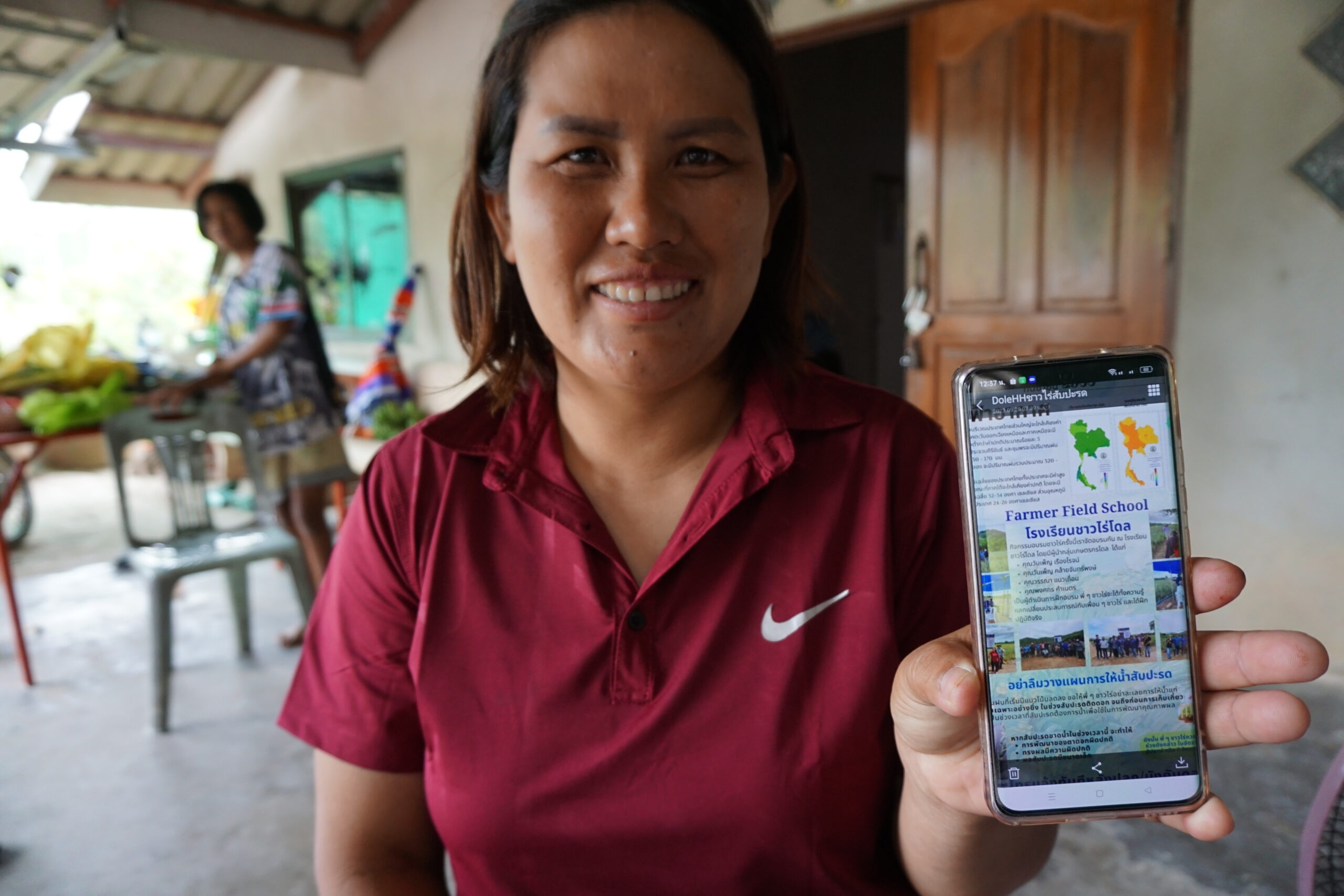
SoliTrace Benefits Thailand Farmers
2023 saw the rollout of an extension of the SoliTrace system, in partnership with Dole, reaching 25 percent grower coverage, creating a continuous improvement system to sustain the impacts of the project’s capacity building. It is reflected in an average yield increase of 14.3 percent and nearly 1.9 billion litres of water savings. The year also marked pioneering steps in regenerative pineapple farming, with comprehensive trials and completion of the first regenagri assessment for the crop.
Results

993,370
farmers trained

1 million
hectares under Good Agricultural Practices

68,458
workers and miners under improved working conditions

146,464
farmers with access to improved services

521,109
farmers with farm income increase

250
processors who have reduced pollution
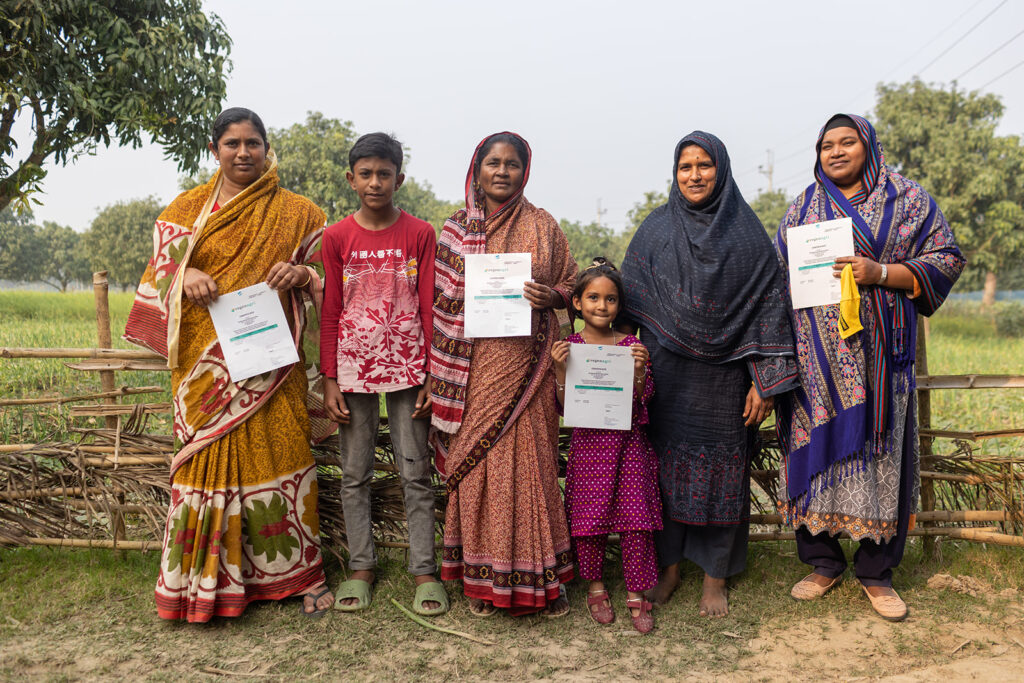
Sustainable ecosystems and empowered communities
Results across four areas
The four pathways of good practices, supportive business ecosystem, enabling policy environment and increased market uptake, have been guiding us towards our end goal — to build sustainable ecosystems and support communities on their journey of self-empowerment.
We need to debunk the narrative to produce more food for the world. This narrative has led to uncontrolled use of synthetic fertilisers resulting in soil degradation, higher GHG emissions and sub par prices. Instead, as Solidaridad we have embarked on a journey that ensures optimum yield, quality produce and better prices for farmers through regenerative agriculture practices.
- In industrial sectors of leather and textiles, we have been able to demonstrate technologies that significantly reduce pollution and save water. A higher number of women were trained in agricultural practices and nearly 30,000 women were integrated into formal supply chains.
- 993,370 farmers were trained in good agricultural practices and regenerative farming. This has helped in creating a mindset shift among farmers towards making regenerative farming the new norm across various commodities.
- Through our support to farmers to produce in balance with nature, 996,294 hectares of land were brought under sustainable management.
- 250 processors were able to reduce pollution at their workplace and work towards waste management as a result of working with Solidaridad.
- 4,940 million litres of water was saved in farming and industry through optimum use of water by using good agricultural practices, supporting water conservation measures at farm and community level, and use of technologies in leather tanneries and textile mills which reduced water consumption.
Our vision on sustainability is strongly embedded in democratic principles of businesses and has strong roots in cooperative/collective movements. Participation of farmers in value chain activities has been amply demonstrated to result in higher incomes and quality services for farmers. In 2023, we strengthened our efforts to promote local entrepreneurship and farmers’ collectives while strengthening their governance.
- 1,145 farmers became co-owners in the supply chain across commodities.
- Solidaridad Asia supported 469 entrepreneurs to build a financially viable business model. The entrepreneurs were supported on different trades like agricultural inputs, seed production, vermi-compost, grain trading, and collaboration with private and public sectors for improving backward and forward services. These capacity building arenas included book-keeping, financial management and business planning.
- 146,464 farmers reported to receive new or improved services from service providers supported through Solidaridad.
- 3,341 beneficiaries were provided with additional employment as a result of Solidaridad’s support.
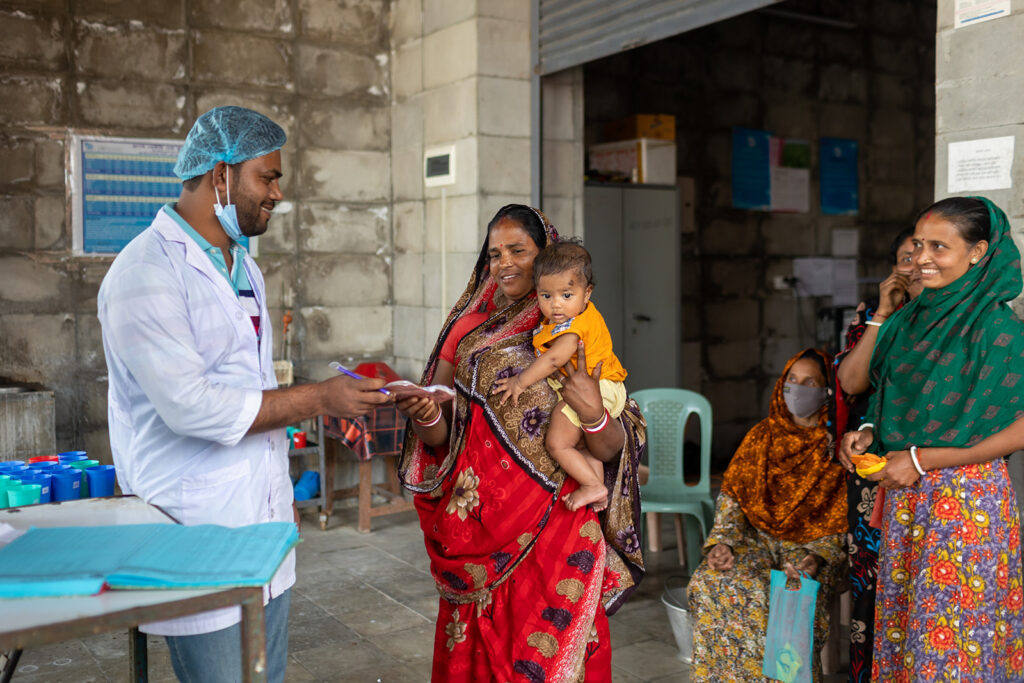
While at the country level, government and private sector policies are key enablers for augmenting our efforts towards a better and sustainable country, it is imperative that regional (Asian) countries form alliances to promote sustainable trade. With Asia being the largest producer and consumer of most agriculture produce, bringing forward the Asia perspective in framing world sustainability order is crucial.
In 2023, we have achieved the following results in policy influencing:
- Regional and national sustainability frameworks and multi-stakeholder platforms have been driving fair value distribution in the chain and sustainable trade and consumption across the Asian countries as a result of working with Solidaridad. In 2023, the four sustainability frameworks developed, or improved, with Solidaridad support have created important improvements in the sector performance in palm oil, soy, cotton, and tea.
- Solidaridad Asia worked with 216 civil society groups in the year 2023 to help them improve their involvement in decision-making.
- 132 corporates were supported in the year 2023 who implemented sustainability solutions and policies at their organisations.
The uniqueness of our market uptake strategy is the inclusion of consumer voices. Through media campaigns and traceability applications, 2023 saw a remarkable outreach to the consumers. Our efforts to link the smallholder farmers, enterprises producing sustainable goods in leather and textile, and more importantly, building markets for players engaged in waste to value products, resulted in achievements like these:
- 16,700,336 individuals were activated to potentially purchase sustainable products through Solidaridad awareness initiatives.
- A total of 2,043,806 tonnes of volume was sourced sustainably by brands supported through Solidaridad Asia’s projects.
Stories that Matter
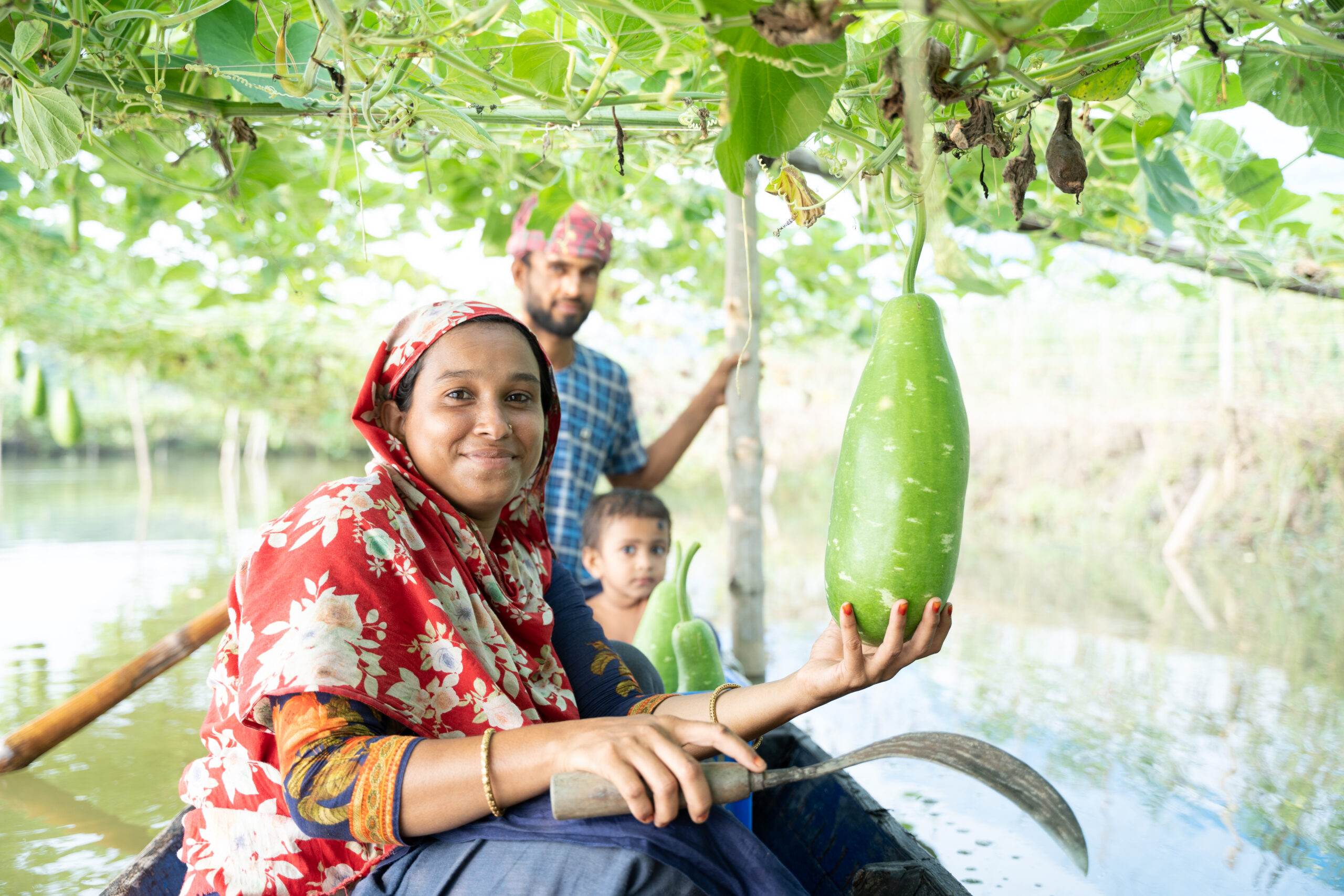
Water Access Transforms Village Life & Agriculture
Innovative approaches to water and land-use planning are changing agriculture across five districts in coastal Bangladesh. Young farmers have seen a profound effect on their livelihood as they implement sustainable practices based around the local ecosystem. SAFAL for IWRM’s community-based water management model is protecting and restoring watersheds to foster resilient agriculture across southwest Bangladesh, with a goal of reaching 90,000 farming households, benefiting 450,000 community members.
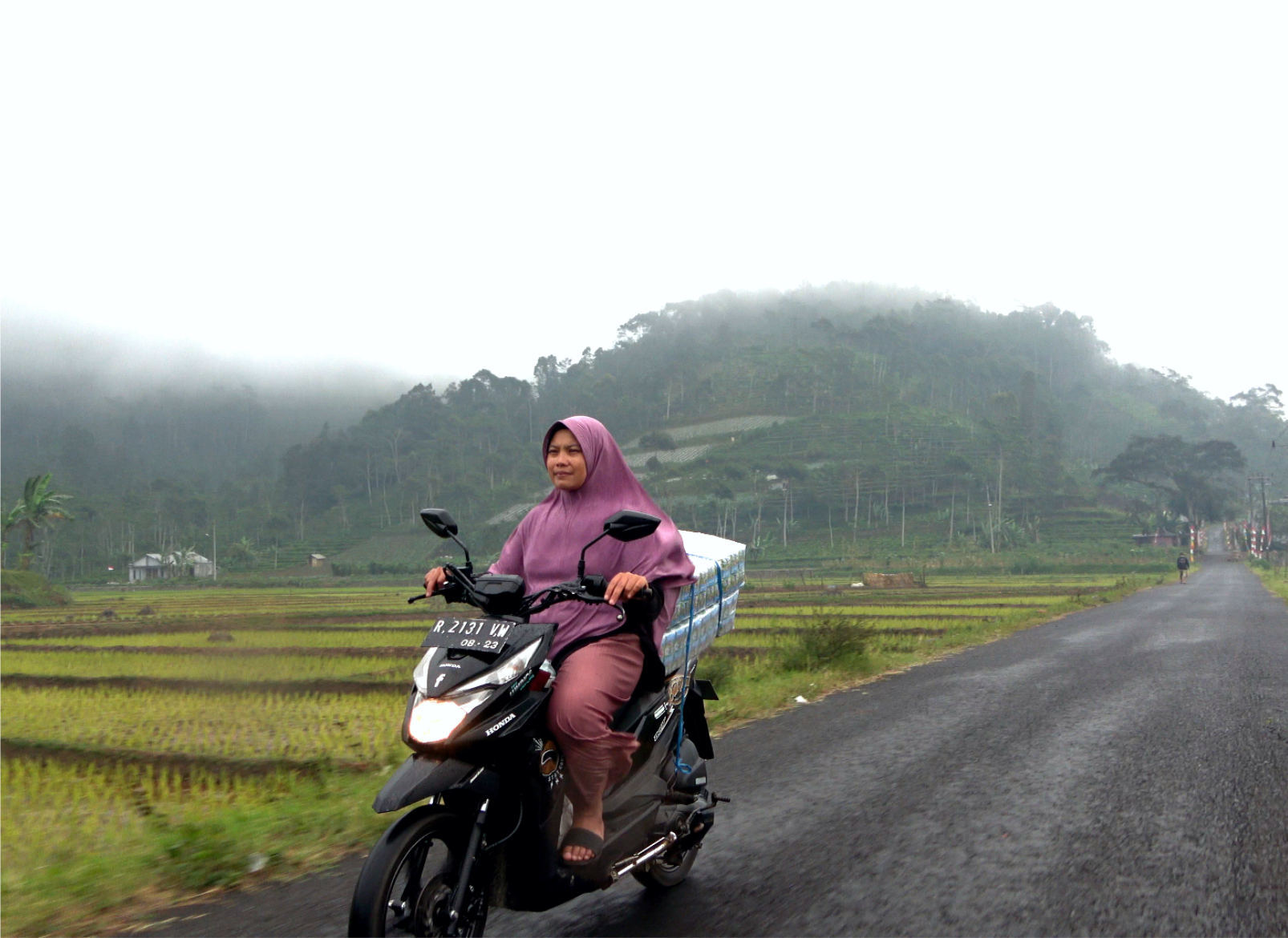
Connecting Small Tea Growers with Markets
Improving agricultural practices and ensuring the sale of tea leaves alone cannot strengthen the position of farmers in the tea supply chain. Having realised this, the Paguyuban Tani Lestari, an umbrella organisation of more than 40,000 Indonesian tea smallholders in 14 districts, has introduced an innovative approach to support farmers with market access, fair compensation and environmentally sustainable practices.
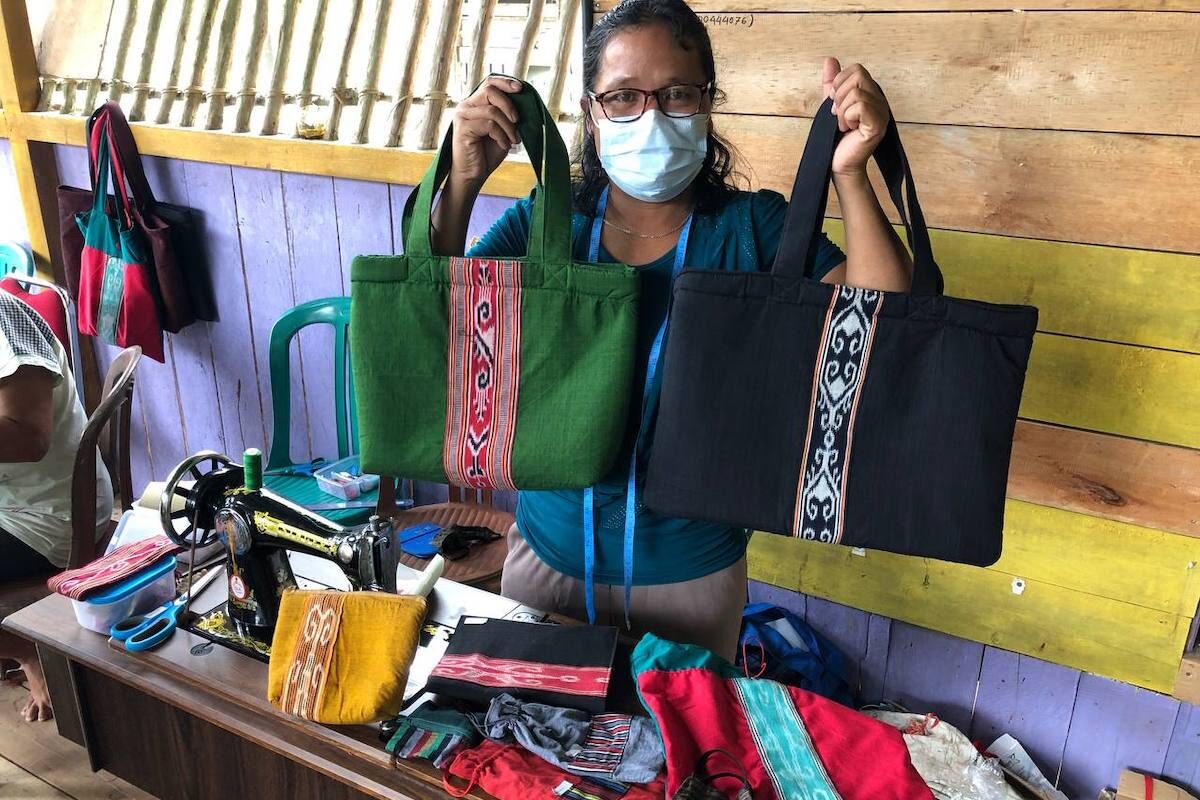
Indigenous Dayaks Reclaim Right to Food and Forests Through Agroforestry
In Indonesia, deforestation is a major concern that leads to severe land degradation. The regions most affected are inhabited by the indigenous communities like Dayaks. In the Ensaid Panjang village, steps have been taken towards sustainable agricultural and forestry practices fostered in the community living there.
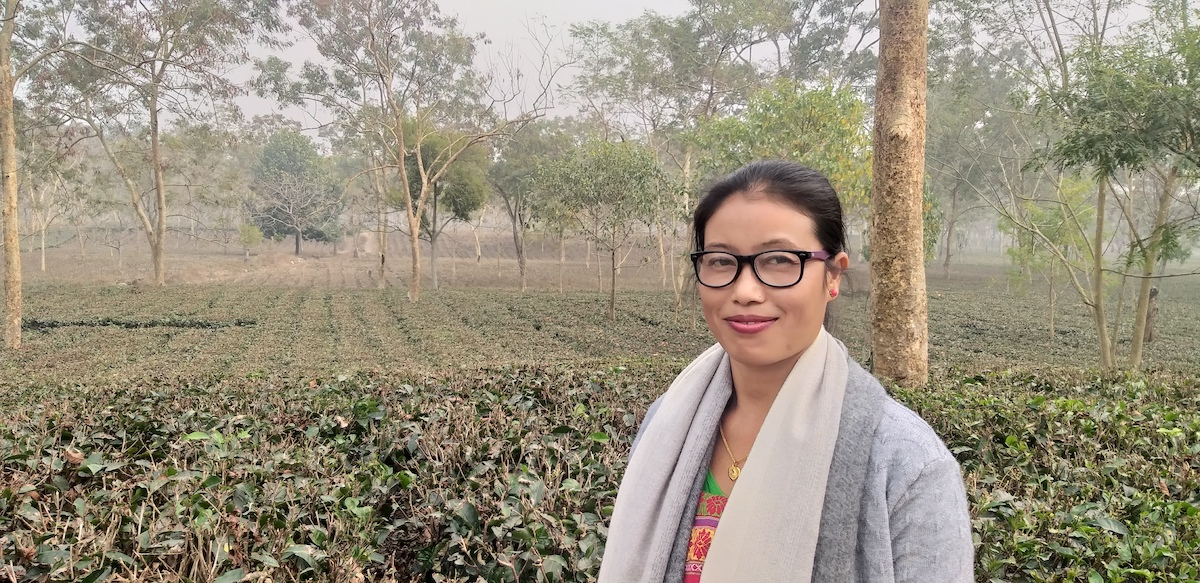
Of Grits and Guts: A Success Story in Tea
Karuna Dairmari has turned herself into a model farmer. Not only does she support 18 women and 7 men by providing them employment on her farm, she is also a devout adherent of sustainable farming practices. Her efforts and vision have inspired 19 widows in her village to join a self-help group (SHG) set up under the tea programme that is supporting women by promoting and training them in entrepreneurship, and helping them avail certain schemes of the Tea Board of India
Sustainability Solutions
Building new pathways
We are harnessing the potential of sustainability financing to save 1 trillion litres of water and bring 1 million hectares of land under regenerative practices; building an inclusive service delivery and forward integration model that addresses smallholder issues; using market as a lever to invest in women; and minimizing the carbon footprint of tanneries.
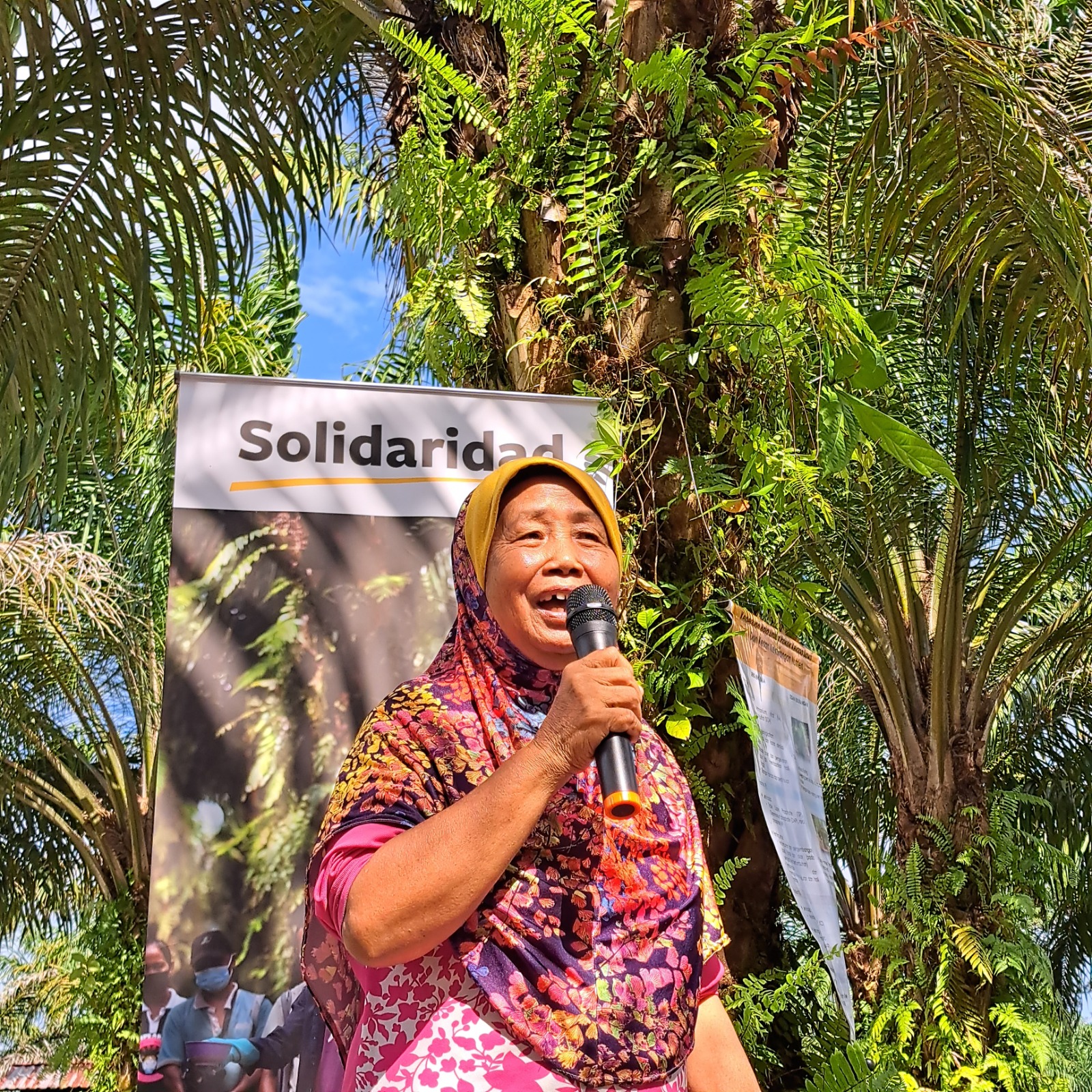
Women are the cornerstone of agriculture, representing 43 percent of the workforce, globally. Even with their outsized contributions in agriculture, women are often overlooked. Closing the gender gap in agriculture would produce significant gains for society by increasing agricultural productivity, strengthening value chains, reducing poverty and hunger, and promoting economic growth.
Solidaridad Asia takes a feminization of the agricultural supply chain approach that challenges the barriers to women’s advancement, and uses the market as a lever to invest in women, both economically and socially. It begins by ensuring that within the entire supply chain, from production to the end user (retail), there is a deliberate effort to embrace gender diversity and promote the inclusion of women at every stage. Three pathways have been identified:
- Resilient and Inclusive Production System: Empanel women in the formal supply chain and ensure equitable access to services and inputs for women. Promote access to financial services tailored to women.
- Inclusive Service Delivery: Promote women-led enterprises in the supply chain through supplier diversity programmes, capacity-building, and support for women entrepreneurs. Enable women to acquire necessary skills and knowledge.
- Fostering Inclusive Market Systems: Engage in policy advocacy with companies and governments to eliminate structural barriers and create gender-inclusive policies.
Our pilot programmes in Bangladesh, India and Sri Lanka have demonstrated that the private sector has the potential to accelerate progress for women in agriculture, particularly in low- and middle-income countries. It’s just a matter of getting started by taking steps towards gender inclusivity in sourcing in the supply chain.

Bangladesh is the seventh largest producer of mangoes globally, but its smallholder mango farmers face a double whammy.
- For a sustainable livelihood, they have to ensure improved crop productivity, even as soil health deteriorates due to intensive farming and the excessive use of chemicals.
- To access international markets, they have to comply with a number of conditions, including the adoption of good agricultural practices to record keeping and traceability, proper harvesting and packaging, and quality assurance.
Solidaridad is supporting smallholder mango farmers in Bangladesh’s Satkhira and Jashore districts to adopt regenerative farming practices to improve soil health as well as their income. Intensive training was provided on plantation of cover crops, netting the orchards, using bio-pesticides, producing compost, and ensuring efficient use of water and energy on the fields, the judicious use of chemicals, implementing health and safety measures, and maintaining farm record books for traceability. The interventions resulted in the regenagri certification of 500 mango farmers in 2022 for a period of three years.
In 2023, these 500 farmers continued to practise regenerative farming over 4,633 acres of land. They were supported with follow-up training for continuous improvement on the regenagri standard – 40 percent of the farmers are cultivating cover crops to reduce/mitigate GHG emission and improve soil health and 93 percent are using compost. Says Shathi Sultana, a regenagri-certified mango farmer in Satkhira: “I have learned to use only green-labelled pesticides, which are not harmful to the environment and I try to use compost. I have become conscious about not hurting the earth while farming.” Shathi has improved her income through crop diversification and efficient pest and water management.

Solidaridad and the International Finance Corporation (IFC) in a unique collaboration intend to generate 1 billion US dollars (direct and leveraged) in financing to promote and facilitate development of green and inclusive supply chains of select private sector agribusiness companies in South Asia that impact the lives of 1 million smallholder farmers. Harnessing the potential of sustainability financing to these companies, the effort aims to save 1 trillion litres of water, abate/sequester 1 million tonnes of greenhouse gas emissions, improve working conditions for half a million workers, and bring 1 million hectares of land under regenerative practices. The collaboration will focus on South Asian countries of Nepal, Sri Lanka, Bangladesh and India.

Solidaridad Asia’s innovative and inclusive service delivery and forward integration model addresses a range of issues faced by smallholders like better access to quality inputs, infrastructure, finance and markets, and non-inclusion in the formal supply chain. The Bharatkhand Consortium of Farmer Producer Organizations facilitates establishment of a direct link between farmers and market players, while ensuring integration of farmers within the formal supply chain. It is supporting smaller farmer producer organizations (FPOs) and agripreneurs with institutional strengthening, business planning, legal compliances among other aspects. For instance, Dewas Kisan FPO, one of the 35 farmer producer organizations associated with Bharatkhand, has inked an agreement with a leading soy processor in India for the aggregation and supply of soy, with the producer organization directly procuring from the farmers and supplying it to the company. The farmers benefit from advance price discovery at the farm gate, transparency in weighing and timely payments.
Each farmer producer organization enrolled with Bharatkhand serves around 1,000-1,500 farmers in a cluster of 15-20 villages. The Bharatkhand Krishi Bazar is a one-stop solution for the farmers to access expert advisories, quality inputs and seeds. After paying a nominal annual fee, farmers are accessing a package of services on expert consultation and guidance on good agricultural practices, soil testing, and availability of agri-inputs at discounted prices, resulting in 20-25 percent saving on input costs, increased farm productivity and a 25-30 percent increase in income.
With a potential base of nearly 250,000 farmers in Madhya Pradesh and Rajasthan who are already engaged through various programmes of Solidariadad, Bharatkhand aspires to serve all of them over the next three years. It is leveraging the expertise of Institute of Rural Management-Anand and the State Institute of Agriculture Extension and Training, Government of Madhya Pradesh. Plans are afoot to engage the Indian Institute of Management-Indore, one of the best business schools in India, for technical support. Going forward, the farmer producer organization would also be supported with innovative tools like traceability and prepared for various certifications to tap the global organic and carbon markets.

The carbon footprint of bovine leather amounts to approximately 65 kg CO2 / sq. mtr. With over 2 billion square metres of leather produced globally each year, this creates a substantial environmental impact. To address this, greener technologies are crucial. In the Kolkata leather cluster, Solidaridad has been working with 100 tanneries to effectively minimize these footprints. The latest audit and life cycle assessment of Solidaridad’s interventions in five selected tanneries, conducted by TÜV SÜD South Asia, revealed significant achievements, with each tannery surveyed averting an estimated 150 tonnes of CO2eq per year in greenhouse gas emissions (Scope 2 and Scope 3) through just three technical innovations (desalting, water optimisation and accurate weighing) at the process level. The greenhouse gas-avoidance potential of these measures can, in fact, rise to around 500 tonnes of CO2eq per tannery per year. The goal is to make at least one tannery carbon neutral in the next year, under the PAS 2060 certification.
Solidaridad in India is, currently, directly engaged with approximately 300 leather enterprises. For the future, Solidaridad is researching the potential of green house gas avoidance through solid waste recycling solutions. It is also exploring the potential of generating renewable sources of energy (wind, solar and biogas) from tannery waste. These learnings will be shared with other commodities and projects within and outside India.

In Vidarbha, the heart of the cotton-growing region in Maharashtra, smallholder farmers face economic, health and environmental challenges stemming from inefficient waste management, energy consumption and conventional agricultural practices. Historically, livestock and dairy have been integral to their livelihoods, yet their potential remained largely untapped, leading to wasted opportunities and increased greenhouse gas emissions.
Recognising the critical need for sustainable solutions, Solidaridad initiated a regenerative agriculture programme aimed at transforming the landscape for these farmers. Part of the initiative was the introduction of innovative technological interventions at the grassroots level, such as the implementation of biodigesters. Biodigesters, prefabricated and user-friendly biogas plants, emerged as a game-changer for cotton farmers. Solidaridad spearheaded the deployment of 360 biodigesters across Maharashtra, targeting farmers with modest livestock holdings of 3-4 cows or 2-3 buffalos.
With an installation cost of 500 euros per biodigester, the return on investment became evident within a year of operation. Each biodigester not only alleviated the burden of household energy expenses, saving families an average of 200 euros annually by replacing traditional LPG gas cylinders but also generated approximately 100 litres of organic slurry daily, which substituted for chemical fertilisers and resulted in savings of around 120 euros per annum per family.
The implementation of 360 biodigesters directly enriched over 3,600 acres of land. A substantial reduction of approximately 1155 tCO2e/year was achieved through the adoption of clean fuel alternatives. By seamlessly integrating clean energy solutions with agricultural practices, Solidaridad Asia has provided a strong business case for adoption by cotton farming communities.

Waste management is one of the biggest challenges of the leather sector. In Asia, Solidaridad’s innovative and environment-friendly ‘waste to value’ approach has created a win-win for all stakeholders in the leather supply chain.
For instance, the creation of eco-particle boards from tannery waste is helping entrepreneurs and craftspeople – many of whom are women – in Tamil Nadu make utility and fashion items, providing a strong business case for the intervention. These items were showcased at one of Asia’s largest leather fashion shows. In Kolkata, paver blocks made from sludge, otherwise disposed of at landfill sites incurring massive costs for the tanneries and polluting the environment, have earned appreciation from the industry as well as key government agencies like National Mission for Clean Ganga. Government agencies have also included these paver blocks for pedestrian pathways in leather complexes.
In Kanpur, where more than 400 manufacturing units generate a high volume of fleshings as waste (estimates suggest generation of 150-200 grams of fleshings from 1 kg of raw hide), Solidaridad’s approach is different. In Jajmau, a pilot plant has been set up with the goal of converting 6 tonnes of leather fleshings (daily) into tallow oil in a sustainable manner. As per Solidaridad’s calculations, around 50-60 kg of tallow can be extracted from 1,000 kg of wet fleshing. The intervention, proven to have a more than 100 percent return on investment, not only protects workers and the environment from the hazards of fleshing waste but also greatly benefits the paint and soap industry, which have a high demand for tallow oil.
Organization & governance
Developments
In 2023, a representative office was set up in China. Across departments, we focused on learning and knowledge-sharing among colleagues through various capacity building workshops and training sessions.
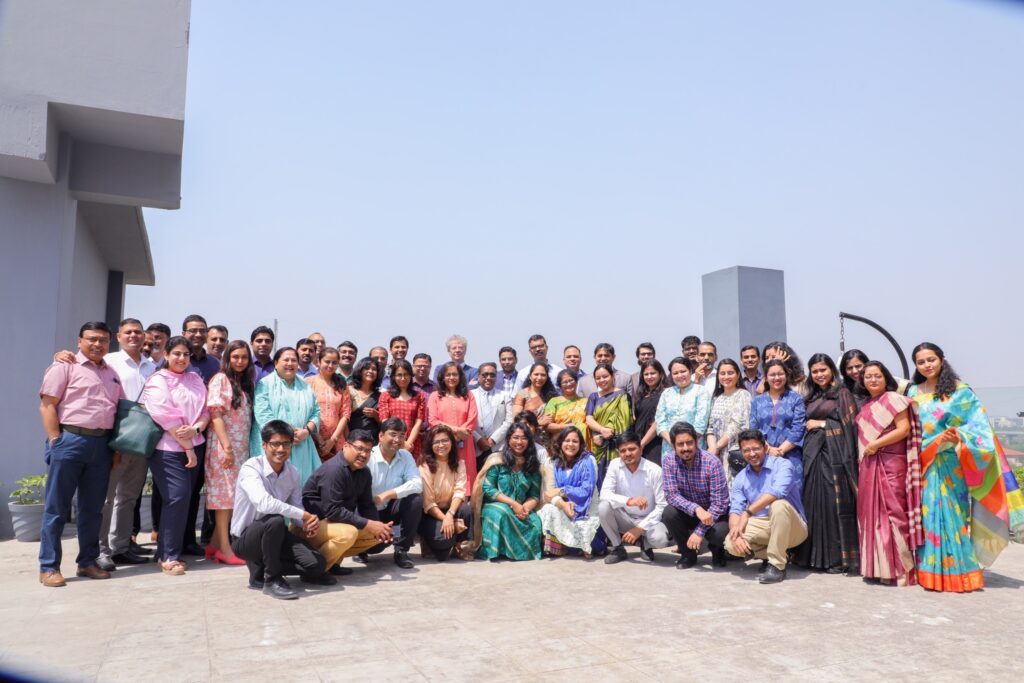
Solidaridad Asia is firmly committed to a policy of equal opportunity in all HR practices based on performance and competencies. During 2023, the Asia Regional HR manual was revised/rechecked for inclusiveness and compliance with local laws, and revisions were made to the allowances considering inflation and the rising costs of accommodations and food while travelling. In alignment with the Asia Regional HR manual, the HR manuals of India and Malaysia were revised. The HR manuals of Indonesia and Bangladesh are in the process of revision, with the finalization being planned in the second quarter of 2024.
During the year 2023, 103 staff and associates were recruited for different positions across Solidaridad operations in Asia; of them 38 percent were female candidates.

The overall gender ratio has gone up to 24 percent in 2023 against the 30 percent target. It is our constant endeavour to ensure women are recruited across all countries of operation and across all hierarchical levels.
An anti-sexual harassment policy is in place for all countries of operation in Asia in alignment with local country laws and regulations. Those will be further reviewed during 2024. Further, internal promotions were provided to female colleagues for mid to senior level leadership. The process of recruitment of a female candidate as Country Manager for Japan was initiated during the end quarter of 2023; the recruitment will be completed during the first quarter of 2024.
During 2023, India’s country office took the initiative to link with reputed institutions to identify suitable female candidates for vacancies. Two female candidates have been selected through this process.
The organization values the individual needs of staff, interns and other associates, and is committed to providing an environment which facilitates work and life balance. During 2023, an annual event with all project teams was organized to discuss project progress and planning which gave everyone a sense of inclusion as they work together to implement the organizational mission and vision. Six onboarding events were organized by different country’s HR with the close coordination of Regional HR to give firsthand information on programmes, HR, communication, and PMEL, with a focused orientation on the values of the organization and integrity policies.
The organization’s human resources philosophy is to provide and nurture a congenial organizational work culture, to help employees strive for growth and excellence in their work. An online fund-raising training was organized during 2023 for 15 participants across different countries in Asia. To encourage participation of youth from rural areas, 126 part-time associates were trained on sustainable agriculture. Of them, 20 percent were female, and selected from the local area of programme implementation.
China
Solidaridad has successfully established a representative office in China, transitioning from its previous status as a Wholly Owned Foreign Enterprise (WOFE), which was part of the Hong Kong entity and thus no longer recognised as a foreign enterprise under the new regulatory framework. Consequently, the China office pursued registration as a branch of the Network Secretariat to maintain its operations and presence within the country. This was the only option available to ensure compliance with Chinese laws and allow Solidaridad to continue its mission within the region. Solidaridad is committed to re-employing staff based on strategic needs and performance.

Solidaridad Network India Private Limited (SNIPL)
SNIPL is the innovation arm of Solidaridad Asia. It consisted of 10 staff and was functioning as a private limited company registered in India with shareholdings under the Network Secretariat as well as Solidaridad Asia. However, due to persistent losses, it became impossible to continue supporting the operations and staff in SNIPL. On 1 March 2024, few of the SNIPL staff moved out and formed a private company called Demetrix Infotech Private Limited. SNIPL is in the process of being kept dormant with few assets. The remaining software was property of SNAL and has gone back to it. Demetrix will continue to provide software support to Solidaridad Asia offices on request.
In 2023, Solidaridad Asia significantly amplified its efforts and reach across social media platforms, garnered extra media visibility, and helped programme teams with outreach, conceptualizing and executing innovative ways and strategies to best leverage and showcase our sustainable interventions, products and technologies. More significantly, the communications team focused on establishing a pan-Asia identity by closely working with our offices in Bangladesh, India, Indonesia, Malaysia and Sri Lanka. These efforts have fostered greater collaboration and synergy across the board, leading to improved outcomes.
Awards
Solidaridad Asia won two awards in 2023. In both cases, the communications team played an important role in editing and designing the submissions, besides also providing creative inputs.
The first award was the Water Sustainability Award (2022-2023) for innovation in water technology in its leather portfolio. This is the second time in a row that Solidaridad has won the award, presented by The Energy and Resources Institute (TERI) in collaboration with the Ministry of Jal Shakti, Government of India, International Water Association (IWA) and the United Nations Development Programme (UNDP) on the occasion of World Water Day.

Solidaridad Asia also won the Diversity and Inclusion Innovation Award at the Food ingredients Europe event in Frankfurt, Germany, in November 2023, for its presentation of the feminization of supply chain concept. At the event, Solidaridad’s efforts to promote farmers’ welfare and well-being were also acknowledged.

Increased visibility
The communications team employed a multipronged approach to scale up the visibility of its efforts on social media channels and websites. Engagement was driven through different forms of content – Solidaridad Network website articles (13), press releases and coverage (in outlets such as The Times of India, the Economic Times, the Navbharat Times and the Dhaka Tribune), LinkedIn articles, reposts, and other interactive visual forms (such as cards, graphics, GIFs and videos). The growth of Solidaridad Asia’s social media presence has been driven primarily via its LinkedIn page in 2023, gaining nearly 2,500 new followers, organically, without the aid of paid boosts. The Asia handle clocked around 250,000 impressions in 2023, with around 120,000 unique impressions. Our Facebook page is also witnessing movement in the right direction, with a post reach of 12,000 and nearly 3,000 content interactions in 2023. For 2024, Solidaridad Asia will also focus on engaging with stakeholders, particularly consumers and young sustainability professionals, through Instagram and a podcast.
The positive movement has enabled regional branches across Asia to strategize their communications operations with more clarity and in a more cohesive, holistic fashion. In Indonesia, we have demonstrated exemplary progress through thoughtful content curation, and strategic timing for posting. Our handles in the country have showcased all-round progress across platforms – doubling their reach and followers on LinkedIn, from 621 to 1,276, and maintaining a steady growth (in interactions and followers) on Facebook and Instagram, besides earning more than 50 exposures and mentions in the national media. A foray into audiovisual content has also helped expand the base, with viewership extending into several thousands of minutes.
Improved engagement
The content shared over the year (in the form of website articles across platforms and publications such as The Good Sight Magazine, plus entries in multiple newsletters and social media write-ups) has highlighted numerous stories of small farmers who are rising above challenges with the support of Solidaridad programmes, as well as shining a light on the many projects that are making a visible difference on the ground by transforming the lives and fortunes of smallholders.
This year also marked the publication of the first edition of the landmark Small Farmer Atlas, a compendium of the voices of nearly 10,000 small farmers in 18 countries across 8 commodities. In Asia, the Atlas was launched in India, followed by launches in Indonesia and Malaysia (in the local languages), in the presence of numerous farmers, programme staff, scientists and researchers, and important government dignitaries. Following this, a dedicated cross-media promotional campaign was held. The Small Farmer Atlas was covered by multiple publications (such as The Good Sight Magazine and ABP Live) with some having a daily reach of above 1 million viewers. On social media, the next few months saw a regular posting of Small Farmer Atlas updates (2 per month), focusing on the unique thematic findings under the individual commodities. Internally, news of the launch was also shared in the India newsletter.
We continued to support our tea programme for a 360-degree campaign targeting online and print outreach. We also ran a week-long dedicated social media campaign in the run-up to the International Women’s Day, #CelebratingWomenChangeAgents, highlighting inspirational stories of women from the field.
Building credibility
To foster a relationship of trust with our stakeholders, be it farmers, brands or policymakers, 2023 has been a most productive year for Solidaridad Asia’s communications team. The team played a vital role in the promotion and dissemination of information regarding learning workshops and big-ticket events. Participatory highlights from this year include The Conference on Advancing the Role of Women in Agricultural Supply Chains, the High Plenary on Collaborative Cotton Futures: ACRE’s Regenerative Agriculture Initiative in India at the 10th edition of CRB’s India and Sustainability Standards Conference, the National Small Tea Grower’s Conference, the 2nd Sustainable Vegetable Oils Conference, and more. The team has also played an important role in coordinating, promoting and presenting takeaways from important workshops and the signing of multiple MoUs and memorandums across Asia in different commodities – leather, palm oil, apparel and textiles, among others. Beyond these activities and functions, the teams in India, Indonesia, Malaysia and Bangladesh also drafted informational brochures, booklets, and leaflets, and distributed Solidaridad-branded merchandise for the participants at the events.
Apart from these aspects, thought-leadership write-ups and op-eds from project managers and thematic heads, with editorial inputs from communications team members, have helped Solidaridad position itself as a key policy influencer, collaborating with governments and private stakeholders to draft important agricultural strategies. Solidaridad’s efforts to position itself as a credible policy influencer also received a boost with the T20 brief, Valuing Water in Agriculture to Reward Farmers’ Actions in Conservation at the G20 Summit 2023 in New Delhi.
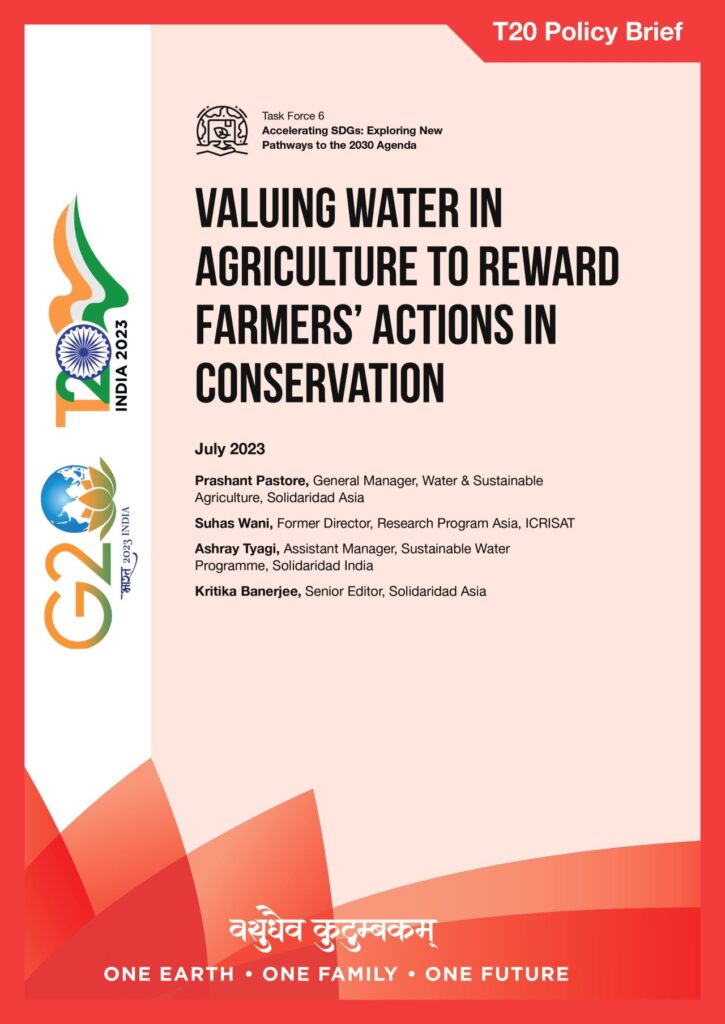
Internal communication and knowledge sharing
In 2023, the communications team in Asia played a leading role in facilitating and organizing several knowledge-sharing and training sessions and webinars for our colleagues. We collaborated with our Europe and Network teams on Yellow Week (an all-Solidaridad online learning and engagement event) , with communications officers from Asia also leading sessions. In the later half of the year, Asia’s communications team, together with the knowledge team, also facilitated and supported webinars (such as the Power of Voice learning sessions) and online conversations with experts and thought-leaders across organisations (such as Free Trade Europa). These sessions featured productive discussions regarding the implications of regulations and directives such as the EU Deforestation Regulation and the EU Corporate Sustainability Due Diligence Directive (EU CSDDD) for small farmers across Asia, also helping the organisation chart a future roadmap for interventions (both policy and on-ground). The India communications team also conducted a day-long workshop on various aspects of storytelling for more than 30 colleagues from Madhya Pradesh and Rajasthan.
Project monitoring and evaluation has been constantly evolving in line with the organizational strategies. The efforts have been directed towards transitioning from a data collector unit to a strategic support function. In 2023, along with improving the data quality, the team broadly focused their efforts on four aspects: methodological improvements, learnings, research, and technology integration.
Methodological improvements
The multi-annual strategy for Asia strongly focuses on regenerative agriculture and decarbonisation of the supply chains. In alignment with the strategy, methodologies to capture the results were devised. The regenerative standard was applied to assess the status at the baseline for the P2P programme. Additionally, a pilot project was conducted with support from TÜV SÜD South Asia Pvt. Ltd to capture the reduction of greenhouse gas emission in the leather tanneries. A similar pilot project was conducted to assess the greenhouse gas emission in textile industries. We are still in the early stages to capture the environmental results of our programme, and we intend to direct our attention in 2024 towards application of methodologies and results, with a focus on soil health, water use efficiency and greenhouse gas emission reductions.
Research
Research is a strong focus for the Planning, Monitoring and Evaluation processes in Asia. During 2023, research studies were initiated or anchored.
- The flagship report of the Solidaridad Network, The Smallholder Farmer Atlas, was anchored by Solidaridad Asia. The report highlighted the perception of smallholder farmers across three critical impact areas of Solidaridad.
- Job creation and enterprise promotion forms the base for building supportive ecosystem services development. A research study was initiated on job creation to help us understand the potential of our proposed strategies on job creation and suggest additional pathways for rural job creation.
- A research study in Bangladesh with the Institute of Water and Flood Management (IWFM) and the Bangladesh University of Engineering and Technology (BUET) focused on physical intervention and community participation in planning and managing the water management in the micro-watersheds.
- Inclusion of smallholder farmers in the carbon market has been a subject of deliberation. To assess the feasibility, viability and applicability of interventions for carbon trade, a research study was conducted among the small tea growers in India.
Solidaridad Asia gave strong emphasis to the learning component in 2023, thereby organizing various capacity building events (both online and offline) for staff on programmatic aspects, as well as the basics of Planning, Monitoring, Evaluation and Learning (PMEL). In 2023, Solidaridad Asia organised a total of 7 learning sessions (3 offline workshops and 4 online webinars). Additionally, monthly digests were shared to enhance team’s knowledge on various relevant topics and themes. Additionally, the team from Asia also supported the global learning team in the Yellow Week to cross-learn from the network.
Innovations and technology are key areas of action for Solidaridad Asia. We continued to use various digital tools like traceability, the Leather trade Intelligence Portal (LTIP) , SoliTrace, and i2i to capture granular data and connect it to our monitoring systems. Additionally, in 2023, we also piloted our in-house data collection application to help us collect the data for project surveys and ensure the data stayed internally within the network server. We also initiated developing a farmer onboarding application for Solidaridad Asia that can aim to centrally create a database and send advisory services to our beneficiaries.
Finance
Solidaridad continued to be financially robust despite administrative setbacks in China and Japan, and a challenging regulatory framework in many Asian countries.
Our budgetary utilization for the year 2023 remained on par with 2022 at around 15 million euros. We added significantly to local fundraising efforts in India, Bangladesh, Indonesia and Malaysia, increasing the share of local funding to 55 percent as against 45 percent of the total funding in 2022.
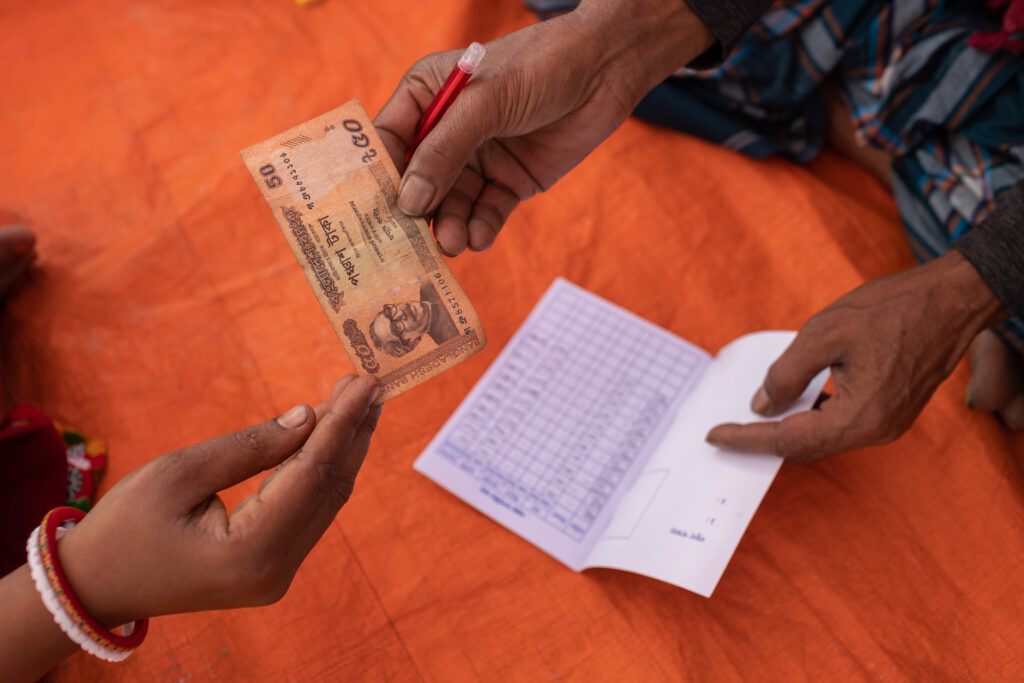
Our pipeline realization is more than 80 percent which demonstrates our ability to convert proposals into projects. Large partnership agreements have been signed, which should materialize in 2024, enabling us to cross the 20 million euros mark.
Our learning from the previous year on lower budget utilization pushed us to draft standard operating procedures at the regional and country level and strengthen our internal control systems. Our audit protocols have been strengthened for timely completion of the audits.
In 2023, the Asia Regional office was established. The year also saw the formation of the India finance team, with transference of responsibilities and a system for consolidation of accounts. We recruited our Financial Controller in 2023 and under his leadership the finance team is gearing up the systems to manage 20 million euros budgets.
The accounting practice involves recognizing income and expenditure based on receipt and expenditure. However, given the challenges of money brought forward and receivables, we have adjusted the income figures to reflect the true picture. Our income figures include:
- Grants received in 2023
- Income recognized from match funding
- Income recognized for expenses incurred but yet to receive inflow of money
- Income brought forward from the previous year

We added new donors in HSBC in Bangladesh, Nayara Energy (corporate donor) and National Mission for Clean Ganga (government donor) in India, GIZ in Indonesia, and Cargill in Malaysia. Our continued partnership with the Dutch Embassy in Bangladesh further strengthened with a 7 million euros grant until 2027. We received a grant from the Government of India on a non-competitive basis further cementing our role as a sustainability partner for the Clean Ganga Mission. Our association with RVO continues to stay strong with multiple projects being sanctioned across Asia. The Government of the Netherlands’ support continues in the form of two programmes.
Our sustained efforts to raise local funding, as mentioned in the earlier section, increased by 31 percent from 2022 (8.6 million euros in 2023 as against 6.6 million euros in 2022) and now stands at 55 percent of our total income. The share of income from Solidaridad organizations dropped, from 55 percent in 2022 to 45 percent in 2023.

We continue to utilize 75 percent of our budget for direct project activities. In 2023, our employee expenses were 25 percent of the total expenses against 30 percent in 2022. This has been a deliberate human resource management strategy to engage with partners and consultants, which provides flexibility in our operations.

The 2023 expenditure also includes co-funding and match funding from prominent partners, contributing to achieving common goals through the projects. Funds to the tune of 0.675 million euros are routed through these partners within our projects which are a part of overall expenditure

